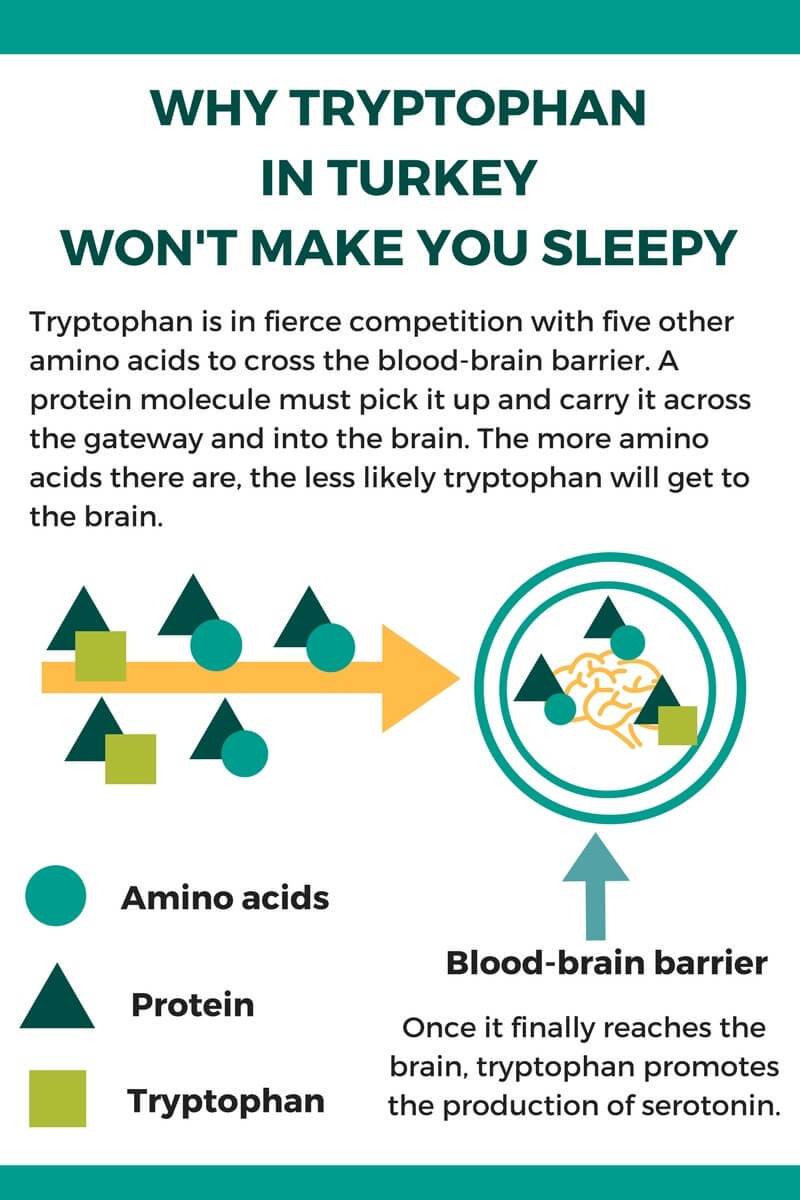
You’ve heard it for decades. Tryptophan — a substance found in all dietary proteins, including those in turkey —is the reason you become sleepy after a big holiday dinner. But the surprising fact is that tryptophan found in turkey proteins has absolutely nothing to do with your sudden after-dinner desire to take a nap.
What is Tryptophan?
Tryptophan is an essential amino acid found in animal proteins. It’s not produced by the body but instead is found in small amounts in all foods that contain protein (usually about 1% or 2% of the amino acids). It is also a precursor for serotonin, a brain chemical that is involved in sleep onset and maintenance.
Tryptophan has been the center of the oft-repeated tryptophan myth that its consumption — in turkey specifically — induces sleep. But this myth that has no basis in scientific fact. Here’s why.
The Tryptophan Myth is All in Your Head, Quite Literally

What scientists know is that tryptophan resides all over the body: in the bloodstream, brain, and all the other organs. When tryptophan levels in the brain rise, more of it is converted to serotonin, the hormone that promotes sleep.
However, eating protein (like turkey) doesn’t increase the amount of tryptophan in the brain. The reason is that the blood-brain barrier, a wall of protective cells, keeps tryptophan from passing through the bloodstream into the brain.
The only way tryptophan can make its way into your brain is if a special protein molecule in the brain’s capillaries picks it up and ferries it across. But tryptophan is in fierce competition with five other amino acids vying for access to the brain–causing the gateway to becomes clogged so very little tryptophan can get through. The more protein you eat, the more amino acid molecules tryptophan must compete with to get through the gateway. As a result, less tryptophan enters the brain simply because it’s more difficult for it to move through the blood-brain barrier.
If It’s Not the Tryptophan in Turkey Making You Sleepy, What Is?
So, if it’s not tryptophan that is causing your post-meal malaise, then what is? You might want to take a hard look at the carbohydrates, including those on your dessert plate. A high-carbohydrate meal such as one with potatoes, pasta or stuffing or cake, is the real culprit behind the turkey tryptophan myth.
Carbohydrates trigger the release of the hormone insulin which particularly lowers the blood levels of the half dozen amino acids battling with tryptophan to get across the blood-brain barrier. Those lower amino acid levels allow more tryptophan to reach the brain. In turn, the tryptophan that reaches the brain then promotes the production of serotonin – making you sleepy. So, it’s the carbs, not the turkey, that makes you drowsy.
Food and Tryptophan for Sleep
Tryptophan supplements are available in doses between 200 mg and 1 g. The best way to find the right dosage that won’t make you feel groggy the next morning is starting with the lowest dose and taking it for three to four days. Then, adjust the amount you take based on how it makes you feel so you can minimize side effects. Side effects of tryptophan are a headache, lightheadedness, drowsiness, dry mouth, visual blurring, and muscle weakness.


